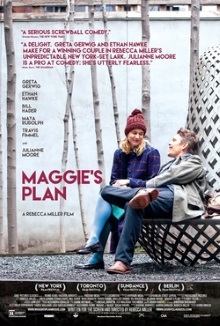
I had no idea what Maggie’s Plan was about except that it showed up in the usual lists of the best films of the year. So I was surprised and somewhat pleased when I realized that this is something like an updated version of the romantic comedy genre. I’ve never watched anything by director Rebecca Miller before but it has a cast of serious performers including Ethan Hawke, Julianne Moore and even a cameo role by Wallace Shawn.
Maggie Harden, who works at a university helping art students commercialize their work, feels her biological clock ticking and decides to have a child on her own. Though she has several male friends, her romantic relationships never seem to last so she wants to use the sperm of one of them to make herself pregnant. Around the same time however she meets John Harding, a part-time professor of anthropology at the same university. He reveals that he spends most of his effort on writing a novel and is delighted when Maggie agrees to read his draft. Despite the fact that he is already married, to Georgette, a more famous and successful professor, and has children, the two fall in love as they bond over John’s novel. Fast forward three years and Maggie is now married to John with a daughter, but she realizes that she no longer wants to be with him. So she hatches a plan to get him to go back to Georgette.
This film is like a poster child for the kind of white people liberal academia that Trump supporters love to despise. When John’s academic specialty is mentioned, “ficto-critical anthropology”, I was convinced that it was a fake field meant to sound as ridiculous as possible to mock this tribe. But when I looked it up and discovered that it’s real, I also realized that the whole film plays all this stuff straight and isn’t meant to be really cutting, even when it talks about Maggie’s friend the pickle entrepreneur. There’s some measure of self-denigration, to be sure, but it’s very gently done. As such this must be a film for whom going to academic conferences and setting aside years of your life to write a novel are either perfectly normal or even something to aspire to. This cause me to reevaluate my entire opinion of this film, leading me to see it in a much poorer light.
I did like how this seems like a very deliberate attempt to reinvent the rom-com genre by emphasizing how they don’t necessarily need to end with the male and the female protagonist staying together. The performers are excellent with my favorite being Julianne Moore playing a Swedish professor. Greta Gerwig is endearing as Maggie but it feels like she’s tapping into the same sort of cute clumsy girl personage that she did in Frances Ha, a far superior film. It is rather cool how she can be upset without really being angry and so remain a rather pleasant person. Oddly enough Hawke seems like the weakest link as he just doesn’t have much to do. The film has a light tone throughout but there aren’t any truly funny moments.
Overall this feels like a film that tries to be modern and hip yet is horribly out of touch with the lived experience of the vast majority of Americans. It’s very much not in tune with the prevailing zeitgeist, so much so that it’s hard not to see it as being offensive in its particular choices. When John remarks about how well Georgette knows him, I was flabbergasted by the snobbish intellectualism of the postmodern jargon that they employ. I wonder who is meant to be able to empathize with these characters? Perhaps the genre of the rom-com is doomed to always be insignificant fluff but this one feels especially wide of the mark.